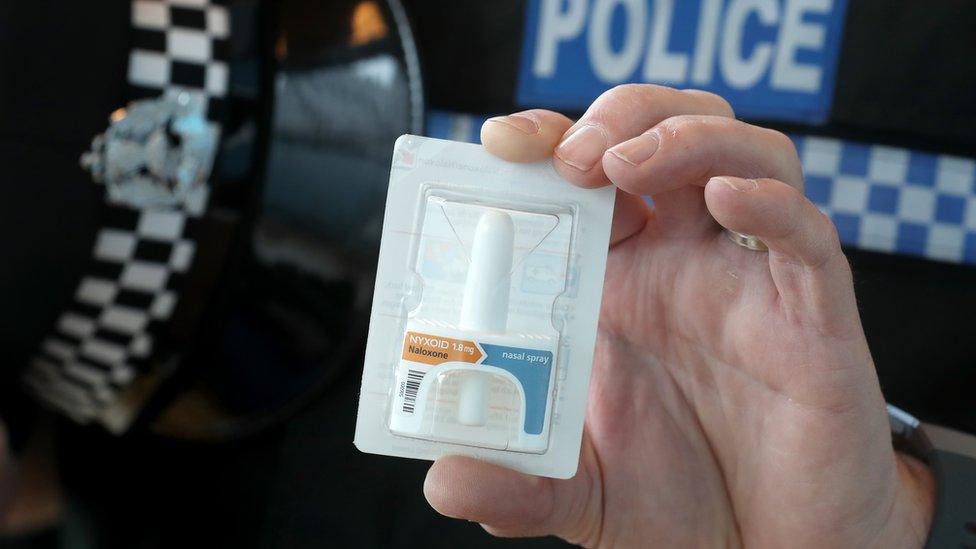Three men's deaths in Birmingham related to new synthetic drug
- Published

Dr Judith Yates first identified the three deaths caused by N-pyrrolidino etonitazene
Three men have died after taking a new synthetic drug, the BBC has learned.
The three deaths in Birmingham, since October 2021, happened after the men took opioid N-pyrrolidino etonitazene.
Students Dylan Michael Byfield-Levell, 20, and Jakob Wozniak, 19, both died. Entrepreneur Miles Elliott Davis, 27, also lost his life.
Dr Judith Yates, who collates drug deaths in Birmingham and identified the deaths, said she had been "shocked" after seeing the opioid's effects.
Mr Byfield-Levell, from Sutton Coldfield, had an underlying heart condition and was found collapsed at home by a relative at 05:15 GMT on 2 October after being out with friends.
Birmingham and Solihull coroner Emma Brown confirmed his death was due to natural causes in combination with drug and alcohol use.

A consultant from Queen Elizabeth Hospital Birmingham has written about a teenager who narrowly survived taking N-pyrrolidino etonitazene
Mr Wozniak was found collapsed on 3 January 2022. His inquest also confirmed the compound was a primary cause of death.
An inquest is yet to be completed into the death of Mr Davis, who died on 10 October.
However, a pathologist has suggested the cause of death was N-pyrrolidino etonitazene toxicity.
Dr Yates said: "These three cases have come out of the blue, we've never seen this chemical before in Birmingham."
She added the drugs appeared to be a replacement for fentanyl, but were far more potent and were being acquired on the dark web rather than the street.
"There is no way to tell what's in a tablet that you're getting either online or on the street," she said.

The drug is reportedly stronger than fentanyl

What is N-pyrrolidino etonitazene?
N-pyrrolidino etonitazene is a synthetic opioid, 20 times stronger than the drug fentanyl.
Opioids are a type of medicine that help relieve pain.
It was first identified in May 2021.
The compounds found in the drug were originally developed in the 1950s and 60s.

A person thought to be the first in the UK found to have taken the drug was an 18-year-old man who, in July 2021, was discovered unresponsive and breathing noisily by his mother, who then began CPR.
He was treated by Dr Mark Pucci, a consultant at University Hospitals Birmingham Trust.

Dr Pucci said the compounds found in the drug were originally developed in the 1950s and 60s
When paramedics arrived he had no pulse and was not breathing but was saved by an injection of an antidote naloxone; he was then sedated and placed on a ventilator.
"He was very lucky to survive. It was only really the quick thinking of his mother," said Dr Pucci.
"He went into respiratory arrest and cardiac arrest, so is very lucky to be alive."
Dr Pucci, who has written a report on the 18-year-old, said animal studies showed the drug was 1,000 times more powerful than morphine.
Larger quantities of the antidote naloxone are needed to treat it because of its potency.
"These cases are not really picked up on routine drug tests, so there may well be other cases that we don't yet know about," Dr Pucci said.
"I understand that there may be some recent cases in London."
N-pyrrolidino etonitazene is made up of compounds Dr Pucci said were originally developed in the 1950s and 60s.
They come from China, where they tend to ban one substance at a time, and arrive in the UK via Russia or Eastern Europe, he said.

Follow BBC West Midlands on Facebook, external, Twitter, external and Instagram, external. Send your story ideas to: newsonline.westmidlands@bbc.co.uk, external
- Published17 March 2022

- Published4 January 2020

- Published31 October 2019
